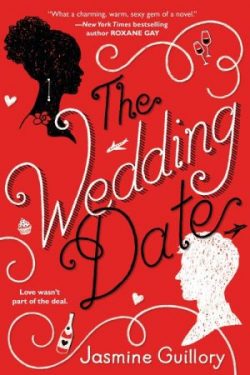In February, Morgan and I read The Wedding Date by Jasmine Guillory to celebrate Wedding Month. Below is a short synopsis and what I thought of the book!
Alexa is trapped in an elevator with a sexy stranger who charms his way into her purse (by eating her snacks) and into attending a wedding with him that weekend as his fake girlfriend. When the two attend the wedding, they find that there is nothing fake about the way they feel about one another.
Both Alexa and Drew are afraid to admit their true feelings but still try long distance dating and find it hard to juggle work and their complicated pasts.
I really liked this book; it tackled real issues in a respectful way, and I look forward to reading more in the series!
After loving our February read, I am so excited to get started with our March TV6 Book Club Pick! Below are our 4 options for March including our winning title! Feel free to check them out from Davenport Public Library!
 ***TV6 Book Club Winner!
***TV6 Book Club Winner!
The Only Woman in the Room by Marie Benedict (In Honor of Women’s History Month)
Hedy Kiesler is lucky. Her beauty leads to a starring role in a controversial film and marriage to a powerful Austrian arms dealer, allowing her to evade Nazi persecution despite her Jewish heritage. But Hedy is also intelligent. At lavish Vienna dinner parties, she overhears the Third Reich’s plans. One night in 1937, desperate to escape her controlling husband and the rise of the Nazis, she disguises herself and flees her husband’s castle.
She lands in Hollywood, where she becomes Hedy Lamarr, screen star. But Hedy is keeping a secret even more shocking than her Jewish heritage: she is a scientist. She has an idea that might help the country and that might ease her guilt for escaping alone—if anyone will listen to her. (Synopsis by Goodreads)
 Sew Deadly by Elizabeth Lynn Casey (In Honor of National Quilting Day on March 16th)
Sew Deadly by Elizabeth Lynn Casey (In Honor of National Quilting Day on March 16th)
Ever since she moved to Sweet Briar, South Carolina, Yankee librarian Tori Sinclair has been the talk of the tiny town. But she’s been so busy at work, winning over the sewing circle, and trying to forget her cheating ex that she hasn’t even had time to baste together a pillow, let alone mind local gossip. Then she finds the hometown sweetheart dead at her back door…
Everyone believes the police investigator, who’s just fixin’ to link Tori to the murder in a love triangle gone bad. To clear her name, Tori will have to rely on her new sewing sisters and stitch together the truth- or be darned. (Synopsis by Goodreads)
 Romantic Comedy by Curtis Sittenfeld (In Honor of Let’s Laugh Day on March 19th)
Romantic Comedy by Curtis Sittenfeld (In Honor of Let’s Laugh Day on March 19th)
A comedy writer thinks she’s sworn off love, until a dreamily handsome pop star flips the script on all her assumptions. Romantic Comedy is a hilarious, observant and deeply tender novel from New York Times–bestselling author Curtis Sittenfeld. (Synopsis by Goodreads)
 A Proposal They Can’t Refuse by Natalie Caña (In Honor of National Proposal Day on March 20th)
A Proposal They Can’t Refuse by Natalie Caña (In Honor of National Proposal Day on March 20th)
Natalie Caña turns up the heat, humor and heart in this debut rom-com about a Puerto Rican chef and an Irish American whiskey distiller forced into a fake engagement by their scheming octogenarian grandfathers.





 The Chilbury Ladies’ Choir
The Chilbury Ladies’ Choir





